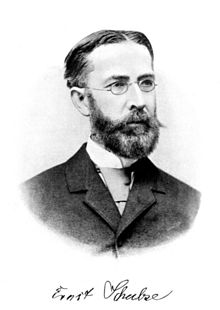Ernst Schulze (chemist)
Ernst Schulze (born July 31, 1840 in Bovenden near Göttingen, † June 15, 1912 in Zurich ) was a German chemist .
Life
His grandfather was the philosopher and councilor Gottlob Ernst Schulze and his father was a senior magistrate in his place of birth, the town of Bovenden near Göttingen . After finishing school, Schulze studied chemistry at the University of Göttingen , a. a. with Friedrich Wöhler and Heinrich Limpricht . For the last semester, Schulze went to Heidelberg , where he completed his studies under Robert Wilhelm Bunsen . For his residency Schulze went to Jena , where he in 1867 Karl Gotthelf Lehmann or in its successor at Anton Geuther doctorate was. Schulze continued his scientific career first in Jena and then at the agricultural research station Weende near Göttingen under Wilhelm Henneberg , before accepting the offer to manage a comparable research station in Darmstadt in 1871 . Just one year later, Schulze was appointed professor of agricultural chemistry at the newly founded agricultural and forestry school at the Polytechnic in Zurich, where his future father-in-law Adolf Kraemer had previously been appointed its first director.
During his 40 years in Zurich, Schulze concentrated on a wide range of plant-chemical studies. For example, he and his doctoral students discovered the amino acids glutamine , phenylalanine and arginine as well as a large number of other organic compounds. Schulze placed one of his main focuses on investigating the importance of the amino acids asparagine and glutamine on the protein metabolism in plants. Schulze also initiated research on vegetable lecithin , cholesterols and phytosterols. At the end of his active time, he researched carbohydrates as a component of plant cell membranes . With this systematic research on plant chemistry, Ernst Schulze is one of the pioneers of the new branch of science, biochemistry, which at that time was still known as physiological chemistry (see under biochemistry ).
In the middle of the 1880s Ernst Schulze received the silver Liebig Medal and in 1907 he won a prize from the Royal Society of Sciences in Göttingen. 1910 Ernst Schulze in recognition of his life's work was supported by the University of Heidelberg , the honorary doctorate Dr. med. honoris causa awarded.
Fonts
- with Ernst Steiger: About arginine. In: Journal of Physiological Chemistry . 11, 1887, p. 43ff. ( online ).
literature
- Ernst Schulze. Obituary. In: Schweizerische Bauzeitung. 59/60, 1912 ( online , PDF; 837 kB).
- Ernst Winterstein: Ernst Schulze. In: Negotiations of the Swiss Natural Research Society. Volume 95, 1912.
- Ernst Winterstein: In memory of Ernst Schulze. In: Hoppe-Seyler's journal for physiological chemistry . Volume 79, Issue 6, 1912, OCLC 743662010 , pp. 353-358.
- Paul Walden: History of organic chemistry since 1880. 1941, pp. 612–631.
- Frank Apel: biography of Ernst Schulze. , Hamburg, July 2015 (PDF; 902 kB)
Web links
- Life data, publications and academic family tree of Ernst Schulze at academictree.org
| personal data | |
|---|---|
| SURNAME | Schulze, Ernst |
| BRIEF DESCRIPTION | German chemist |
| DATE OF BIRTH | July 31, 1840 |
| PLACE OF BIRTH | Bovenden near Göttingen |
| DATE OF DEATH | June 15, 1912 |
| Place of death | Zurich |

